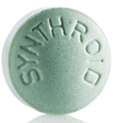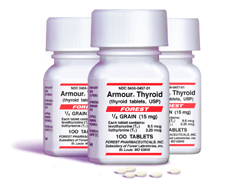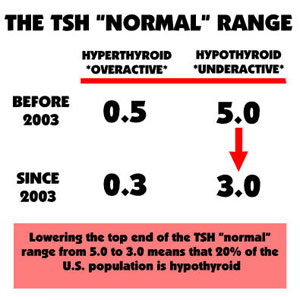Armour Thyroid Side Effects
When it comes to discussing the possible Armour Thyroid side effects, I think it’s important to first understand why they occur and what causes them. If you can do this then you’ll also understand that all Armour Thyroid side effects can be easily avoided.
Unlike synthetic thyroid hormones which are manufactured in laboratories, Armour Thyroid is a natural desiccated thyroid extract that is extracted from pigs.
The successful use of pig thyroid has been around since the late 19th century. And Armour Thyroid was the medication of choice by doctors who successfully treated hypothyroidism all of the way through the first half of the 20th century.
During the late 1940’s the pharmaceutical industry developed a synthetic version of the T4 thyroid hormone. And Armour Thyroid quickly and wrongfully came under scrutiny and was eventually replaced by the new synthetic T4 as the medication of choice. And this has resulted in far less effective hypothyroidism treatment for most who diagnosed through conventional medical doctors.
Armour Thyroid vs. Synthetic T4
One of the biggest problems with this switch was that synthetic T4 and Armour Thyroid were very different.
Armour Thyroid contained a combination of the non-active thyroid hormone T4 and the active thyroid hormone T3 in a ratio that was close to what your thyroid naturally produces.
Synthetic T4 on the other hand contained no active T3 and instead operated under the understanding that by supplying your body with enough T4, it would eventually produce as much T3 you need.
But unfortunately, this idea had some major flaws and it didn’t quite work out that way.
Can Hypothyroidism Be One of the Armour Thyroid Side Effects?
One of the biggest arguments against the use of synthetic T4 thyroid medications is that if the liver, for any reason, cannot convert the T4 into T3 then it could potentially have a negative effect on your thyroid.
The T4 would continue to build up which would signal your thyroid gland to stop producing more T4 and subsequently, T3 as well. And the end result was that you became even more hypothyroid while your hypothyroidism symptoms continued to worsen.
It stands to reason that under this same principle that hypothyroidism could also be one of the Armour Thyroid side effects. Not necessarily to the same degree as the T4 only medication but given the higher ratios of T4 to T3, it can still create the same effect.
Armour Thyroid Side Effects When Dosage Is Too High
On the other side of the fence, there are some side effects that can occur by taking too much Armour Thyroid. But few people understand why.
If too much Armour Thyroid is taken, it can shift your body from a hypothyroid state to a hyperthyroid state. And this means that your cells begin to get too much thyroid hormone.
Important Note: These Armour Thyroid side effects are not unique to Armour Thyroid itself. Any thyroid supplement or medication, if the dosage is too high, can push the body towards hyperthyroidism and the same side effects would apply.
But the mechanism that causes these Armour Thyroid side effects is not an adverse reaction to the medication itself. Rather, when you become hyperthyroid, your body becomes more sensitive to the effects of adrenaline.
So when your blood sugar gets too low or your body comes under stress and your adrenaline levels naturally rise, then the effects of the adrenaline can become amplified.
Mental Armour Thyroid Side Effects
- Anxiety

- Nervousness
- Restlessness
- Irritability
- Depression
- Anti-social behavior
- Inability to concentrate
- Emotional changes
Physical Armour Thyroid Side Effects
- Headaches
- Rapid Heart Rate (tachycardia)
- Heart Palpitations
- Fatigue
- Tremors
- Insomnia
- Hair Loss
- High Blood Pressure
- Increased Body Temperature
- Decreased Libido
- Chest Pain
- Light and Sound Sensitivity
- Flushing
What to Do About These Armour Thyroid Side Effects
I think it’s first important to understand that this hyperthyroidism state is not permanent. It will only last as long as the medication remains active in your body.
Oftentimes, your dosage just needs to be lowered or adjusted to avoid the potential of becoming hyperthyroid.
But if this does happen, then one of the easiest ways to decrease your adrenaline levels quickly is with the use of salt. Drinking a glass of water or juice with a high concentration of salt can help your adrenaline levels to return to normal. And in this process, these Armour Thyroid side effects will lessen and eventually subside.
In the event that you experience any Armour Thyroid side effects related to the worsening of your hypothyroidism symptoms then it’s recommended to work with your healthcare provider to discuss the use of a T3 only medication to avoid the potential buildup of T4. And by sticking to the right hypothyroidism diet you can also ensure that your liver remains healthy and minimize many of these Armour Thyroid side effects.
In any event, these Armour Thyroid side effects should be taken seriously and it’s best to discuss them with your healthcare provider. But oftentimes your medication can be adjusted accordingly to avoid them in the future.

 Believe it or not, T4 only medications are responsible for more thyroid medication side effects than the other forms of medication. And it is pretty apparent with how poor patients have been responding to these medications for years.
Believe it or not, T4 only medications are responsible for more thyroid medication side effects than the other forms of medication. And it is pretty apparent with how poor patients have been responding to these medications for years. Combined T4 and T3 medication such as Armour Thyroid can also cause any of the thyroid medication side effects mentioned above.
Combined T4 and T3 medication such as Armour Thyroid can also cause any of the thyroid medication side effects mentioned above. If you really want to get into the details of this, be sure to check out my free report, 7 Simple Solutions to Hypothyroidism, where I get into all of the details.
If you really want to get into the details of this, be sure to check out my free report, 7 Simple Solutions to Hypothyroidism, where I get into all of the details.
 Monitoring your morning temperature was a concept that was pioneered by an American doctor by the name of Broda Barnes. And Broda Barnes found that your morning temperature which is determined by your metabolism could be strongly correlated with the health of your thyroid.
Monitoring your morning temperature was a concept that was pioneered by an American doctor by the name of Broda Barnes. And Broda Barnes found that your morning temperature which is determined by your metabolism could be strongly correlated with the health of your thyroid. Unfortunately, when any one single part of this process is broken, all the other parts suffer as well, much like a domino effect. So it’s not as easy as fixing the one little broken link in the chain. Once this process is thrown off, you have to work to restore functionality to the entire process to get it working properly again.
Unfortunately, when any one single part of this process is broken, all the other parts suffer as well, much like a domino effect. So it’s not as easy as fixing the one little broken link in the chain. Once this process is thrown off, you have to work to restore functionality to the entire process to get it working properly again.